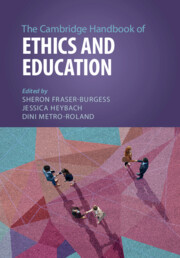Book contents
- The Cambridge Handbook of Ethics and Education
- The Cambridge Handbook of Ethics and Education
- Copyright page
- Epigraph
- Contents
- Figures
- Tables
- Contributors
- Foreword
- Preface
- Acknowledgments
- Part I Traditions in Ethics and Education
- 1 Ancient Chinese Ethics and Education
- 2 Ancient Greek and Roman Ethics and Education
- 3 Ubuntu Ethics and Education in Southern Africa
- 4 Ethical and Environmental Knowledge and Education
- 5 Ethics, Education, and the Inheritance of Abraham
- 6 Prioritizing Outcomes
- 7 Freedom and the Ethics of Educational Authority
- 8 Moral Education in the Virtues
- 9 The Ethics of Bildung and Liberal Education
- 10 American Pragmatism, Democratic Ethics, and Education
- 11 Radical Ethics
- 12 The Ethics of Phenomenology and Hermeneutics in Education
- 13 Feminist Ethics and the Contradictions of Gender
- 14 Postmodern/Poststructuralist Ethics and Education
- Part II Ethics and Education in Practice
- Part III Emerging Ethical Pathways and Frameworks
- Index
- References
2 - Ancient Greek and Roman Ethics and Education
from Part I - Traditions in Ethics and Education
Published online by Cambridge University Press: 07 March 2024
- The Cambridge Handbook of Ethics and Education
- The Cambridge Handbook of Ethics and Education
- Copyright page
- Epigraph
- Contents
- Figures
- Tables
- Contributors
- Foreword
- Preface
- Acknowledgments
- Part I Traditions in Ethics and Education
- 1 Ancient Chinese Ethics and Education
- 2 Ancient Greek and Roman Ethics and Education
- 3 Ubuntu Ethics and Education in Southern Africa
- 4 Ethical and Environmental Knowledge and Education
- 5 Ethics, Education, and the Inheritance of Abraham
- 6 Prioritizing Outcomes
- 7 Freedom and the Ethics of Educational Authority
- 8 Moral Education in the Virtues
- 9 The Ethics of Bildung and Liberal Education
- 10 American Pragmatism, Democratic Ethics, and Education
- 11 Radical Ethics
- 12 The Ethics of Phenomenology and Hermeneutics in Education
- 13 Feminist Ethics and the Contradictions of Gender
- 14 Postmodern/Poststructuralist Ethics and Education
- Part II Ethics and Education in Practice
- Part III Emerging Ethical Pathways and Frameworks
- Index
- References
Summary
This chapter explores several fundamental features of ancient Greek and Roman ethics and considers some ways in which these features are still influential in contemporary education. Ancient ethics was generally undergirded by a substantive cosmology and related philosophical anthropology; ancient thinkers often affirmed the existence of some sort of objective logos that served as the ordering principle of the cosmos and in accordance with which human beings ought to order their lives. This two-fold commitment resulted in a focus on cultivating virtue. The chapter also discusses three educational arenas in which commitment to features of ancient ethics is manifested today: arguments for “flourishing” as an aim of education, “character education” initiatives, and the contemporary K-12 “classical education” movement.
- Type
- Chapter
- Information
- The Cambridge Handbook of Ethics and Education , pp. 24 - 42Publisher: Cambridge University PressPrint publication year: 2024

